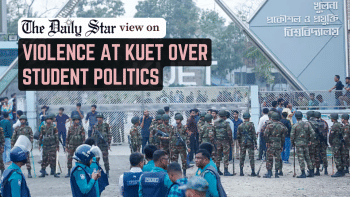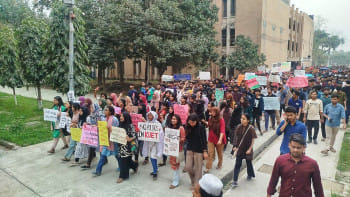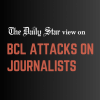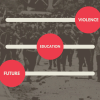Refrain from student politics of old

Given the July uprising's promise of a new political landscape free from toxic and self-serving partisanship, students' involvement in politics or any other organised activity has since attracted great interest. On Wednesday, we saw the launching of a new student organisation—Bangladesh Gonotantrik Chhatra Sangsad (BGCS)—led by some former leaders of the Students Against Discrimination (SAD) platform that coordinated the uprising. This was expected to be a step towards that lofty vision. However, we were greatly disappointed to see skirmishes erupting between BGCS supporters and a group of private university students during the launching event.
According to a report in this daily, private university students were protesting their "exclusion" from the central committee of BGCS, demanding its dissolution. This led to scuffles that left several injured, including female students, with at least two hospitalised. Later, the private university students blocked the Bangla Motor intersection for an hour protesting the "attack" by supporters of the BGCS.
The names of six of BGCS's central committee—including chief organiser, convener, member secretary, and spokesperson—that were initially announced had no private university representation. However, on Thursday, at a press conference, the BGCS announced a full 200-member committee that included students from both private and public universities, madrasas, colleges under the National University, and so on. This raises questions about whether Wednesday's clash was a misunderstanding or a symptom of deeper tensions. Whatever may be the reason, such incidents bear disturbing similarities to the violent, power-hungry politics that plagued our university campuses for decades—precisely what the uprising sought to move beyond, among other authoritarian tendencies and practices.
Wednesday's incident thus goes against the values and ideals students were expected to represent. We urge the leaders of the new student organisation, and all pre-existing student bodies, to distance themselves from the divisive politics of the past, unequivocally reject any sort of violence, and ensure that such incidents do not recur. If they are to embody the values of the uprising, they must prove that student politics can be democratic, inclusive, and free of factionalism.


 For all latest news, follow The Daily Star's Google News channel.
For all latest news, follow The Daily Star's Google News channel. 









Comments